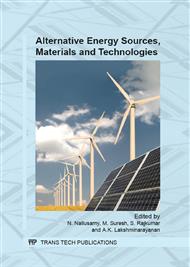p.664
p.669
p.677
p.682
p.687
p.692
p.697
p.702
p.707
Experimental Studies on the Performance of C.I Engine with Fish Oil Methyl Ester as Fuel for Various Blends of Diesel and LPG
Abstract:
Fossil fuels are exhausting quickly because of incremental utilization rate due to increase population and essential comforts on par with civilization. In this connection, the conventional fuels especially petrol and diesel for internal combustion engines, are getting exhausted at an alarming rate. In order to plan for survival of technology in future it is necessary to plan for alternate fuels. Further, these fossil fuels cause serious environmental problems as they release toxic gases into the atmosphere at high temperatures and concentrations. The predicted global energy consumption is increasing at faster rate. In view of this and many other related issues, these fuels will have to be replaced completely or partially by less harmful alternative, eco-friendly and renewable source fuels for the internal combustion engines. Hence, throughout the world, lot of research work is in progress pertaining to suitability and feasibility of alternative fuels. Biodiesel is one of the promising sources of energy to mitigate both the serious problems of the society viz., depletion of fossil fuels and environmental pollution. In the present work, experiments are carried out on a Single cylinder diesel engine which is commonly used in agricultural sector. Experiments are conducted by fuelling the diesel engine with bio-diesel with LPG through inlet manifold. The engine is properly modified to operate under dual fuel operation using LPG through inlet manifold as fuel along FME as ignition source. The brake thermal efficiency of FME with LPG (2LPM) blend is increased at an average of 5% when compared to the pure diesel fuel. HC emissions of FME with LPG (2LPM) blend are reduced by about at an average of 21% when compared to the pure diesel fuel. CO emissions of FME with LPG (2LPM) blends are reduced at an average of 33.6% when compared to the pure diesel fuel. NOx emissions of FME with LPG (2LPM) blend are reduced at an average of 4.4% when compared to the pure diesel fuel. Smoke opacity of FME with LPG (2LPM) blend is reduced at an average of 10% when compared to the pure diesel fuel.
Info:
Periodical:
Pages:
687-691
DOI:
Citation:
Online since:
August 2015
Keywords:
Price:
Сopyright:
© 2015 Trans Tech Publications Ltd. All Rights Reserved
Share:
Citation:


